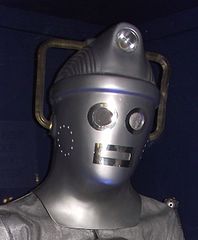Their popularity baffles me, and always has. I don't care for zombies, and ultimately the Borg are nothing but techno-zombies. They lack any interesting motivations, and any allegorical power. What are they a metaphor for? Unless they represent something that's actually relevant and relatable in thematic terms, they're just a race of Scary Monsters, and fighting monsters has never been the focus of what Trek is about.This is also why I said "reboot the borg", they need to go back to being a terrifying, completely alien unstoppable force of nature that just leaves a path of destruction in it's wake.
The Harry Potter books were set in the 1990s, yes... of a world clearly different from our own, just like any fantasy world — one where magic not only works but is the basis of a large and thriving subculture. It was obvious — and the movies made it even more so — that there was no plausible way the "wizarding world" could conceivably exist "hidden from view" of the rest of us. (The impact on real-world political and cultural affairs would be unavoidable. If you're an author and you want to write about a fantasy world, you need to either give up on using characters with "real world" connections, as Tolkein did, or you have the characters transit from here to there, as C.S. Lewis did. While I admire much of what Rowling achieved, her attempt to pretend that "there" was the same as "here" never really worked, and was always one of the most awkward things about those books.)Harry Potter is definitely set in the 'present day', well the 90s at any rate. That's not only explicit in the Muggle characters like the Dursleys but part of the whole attraction of the series, that the fans can imagine there might really be a wizarding world hidden from view...
Perhaps I've gotten old sometime when I wasn't paying attention, but to me something from the '90s still feels about as recent as last Tuesday... and then as now, movies based on video games are things I try hard to avoid. They tend to be about as entertaining as, well, watching someone else play a video game. (Though apparently that's actually a popular and even profitable thing these days, so what do I know?...)Angelina Lara was the thing that made me truly believe in Lara as an icon, so many of my female friends absolutely loved that film...
Meanwhile... there have always been catsuits worn for personal expression and/or empowerment, and also catsuits worn for more exploitative reasons. Even in the '90s, the kind they had Jeri Ryan wear on VOY were pretty clearly in the latter category.







